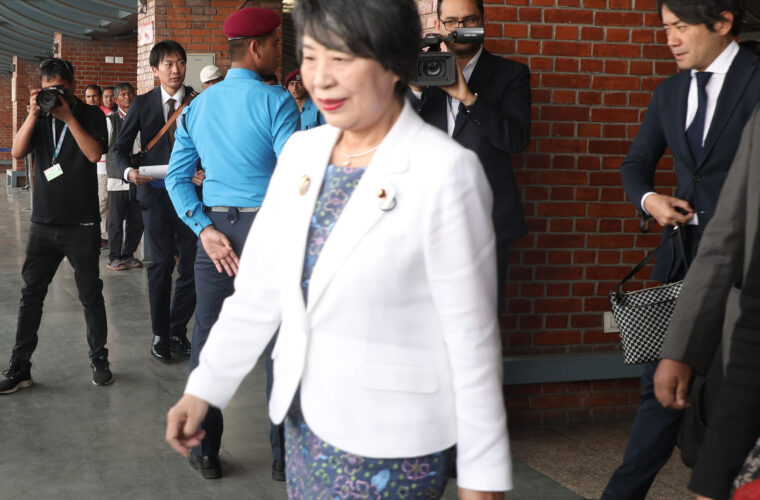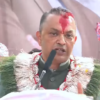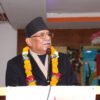Kathmandu, May 5: Japan and Nepal have many things in common. One of them is that 70 to 80% of its land area is covered with mountains and hills. Considering Japan’s history of constantly facing natural threats due to its steep terrain, I can fully understand, as a Japanese, how difficult a challenge it is to undertake nation-building in a mountainous country like Nepal.
The first thing that comes to the minds of the Japanese people when we hear the word “Nepal” is the divinely majestic Himalayan Mountains represented by Sagarmatha (Mt. Everest). Having been born and raised in Shizuoka Prefecture located at the foot of Mt. Fuji, I feel a deep sense of affinity with Nepal, and I am very pleased to be able to visit Nepal for the first time today.
Another thing Japan and Nepal have in common is that both countries are democratic, and Japan has provided various assistance to Nepal’s democratization efforts. After the abolition of the monarchy and the transition to a federal democracy was declared in 2008, Japan dispatched election observers to the parliamentary elections.
In addition, Japan has also provided support for the development of the legal system and various other assistance that contribute to the promotion of democracy in Nepal. When I served as Justice Minister, the Ministry of Justice provided training on civil code and the development of civil code commentaries in support of the preparation for a new civil code of Nepal in cooperation with JICA.
Both countries also have the same unfortunate history of suffering damages due to earthquakes. That is why, whenever the other side was affected by a major earthquake, our two countries have reached out to each other like family, with special compassion and solidarity. After the Great East Japan Earthquake in 2011, Nepal donated 5,000 blankets and our Nepali friends in Japan assisted in the setting up of Nepali soup kitchens as well as provision of Nepali coffee. After the Gorkha Earthquake in 2015, Japan dispatched the Japan Disaster Relief Teams (Urban Search and Rescue Team, Medical Team, and Japan Self-Defense Force Units) and provided an Emergency Grant Aid of approximately 1.68 billion yen as well as Emergency Relief Goods including tents and blankets.
In addition to this emergency humanitarian assistance, Japan provided a total of over 32 billion yen for “Build Back Better” after earthquakes in areas such as reconstruction of schools, residences, and public facilities.
Following the Noto Peninsula Earthquake in January this year, we received heartfelt messages of sympathy from Nepal. Furthermore, the Nepali people living in Japan rushed to the affected areas many times to offer their support, and with the words “Friends should help each other in tough times” they cooked spicy curry to warm and encourage the hearts and bodies of the residents there amid heavy snow and severe cold weather. As Foreign Minister of Japan, I would like to express my profound gratitude to the Nepali people for their warm support and sympathy for Japan.
Japan and Nepal have also faced a scarcity of natural resources. Thus, both countries need an international community that ensures connectivity is free from force or coercion and values freedom as well as the rule of law regardless of the size of the country. To realize such an international community, it is a prerequisite that each country overcomes its vulnerabilities and builds a resilient society. With this in mind, Japan attaches great importance to Nepal will get on track for sustainable growth and stability.
Based on this idea, Japan has been supporting Nepal’s development since 1969 in a wide range of fields, including infrastructure construction such as electricity, roads, airports, and water supply, as well as agriculture, education, and healthcare, with Nepal’s geographical and historical background in mind.
The Nagdhunga tunnel, the breakthrough of which has recently been achieved, is Nepal’s first mountain road tunnel. Once the construction of the tunnel is completed, it will contribute to the promotion of social and economic development in the region and strongly support Nepal’s further development, facilitating the transportation network by meeting the rapidly increasing traffic demand, reducing travel time, and improving transportation safety. Through such assistance in infrastructure, Japan will continue its efforts to ensure that the people of Nepal can experience the safety and convenience of infrastructure in their daily lives.
In recent years, the presence of Nepal across Japan has been on the rise day by day. Over 120 years have passed since the arrival of the first eight Nepali students dispatched by the Government of Nepal in 1902. Today, our two countries are connected by direct flights that take about 7 hours. The total number of Nepalis living in Japan exceeds 170,000, the sixth largest number of foreign nationals living in Japan. I am very pleased to see that our bilateral relationship is steadily deepening thanks to the active participation of our Nepali friends in Japanese society.
Taking this opportunity, I would like to touch on cooperation with Nepal on “Women, Peace and Security” (WPS), which the Japanese government has strongly promoted in recent years and is also my life’s work. WPS is based on the idea that society can be much closer to a more sustainable peace through the participation of women themselves in leadership positions in prevention as well as humanitarian and reconstruction assistance, while at the same time working to protect vulnerable groups such as women in times of crisis.
The Japanese government is strongly promoting WPS, and I have been involved in various initiatives since I became Foreign Minister. Nepal is the world’s largest contributor of personnel for UN peacekeeping operations (PKO) and has the largest number of female PKO personnel in the world. As such, I believe that there is great potential for cooperation with Nepal in the field of WPS. During this visit to Nepal, I would like to explore with Nepal what kind of cooperation is possible in the future.
The year 2026 is the 70th anniversary of the establishment of diplomatic relations between Japan and Nepal, and also the year of Nepal’s graduation from the Least Developed Country (LDC) category. As Foreign Minister of Japan, I would like to further strengthen our relationship with Nepal towards this commemorative year and strongly support Nepal’s further development after graduation from the LDC category.





